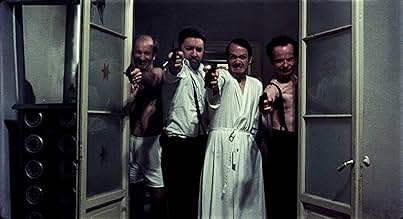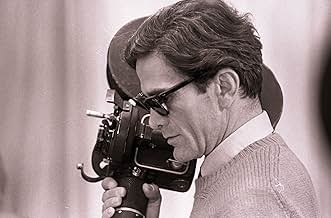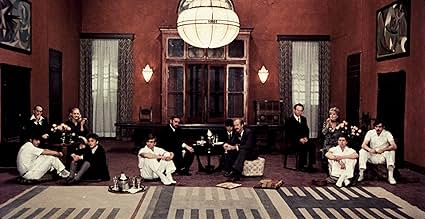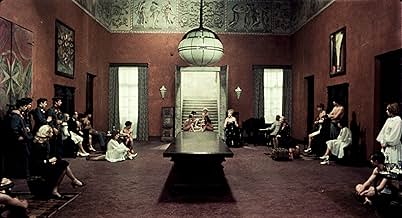
Durante la Segunda Guerra Mundial en Italia, cuatro fascistas libertinos acorralan a nueve adolescentes y los someten a ciento veinte días de tortura.Durante la Segunda Guerra Mundial en Italia, cuatro fascistas libertinos acorralan a nueve adolescentes y los someten a ciento veinte días de tortura.Durante la Segunda Guerra Mundial en Italia, cuatro fascistas libertinos acorralan a nueve adolescentes y los someten a ciento veinte días de tortura.
- Dirección
- Guión
- Reparto principal
- Premios
- 2 premios en total
- Eccellenza
- (as Umberto P. Quintavalle)
- Signora Vaccari
- (as Helene Surgere)
Resumen
Reseñas destacadas
Apparently based loosely on the Marquis de Sade's eponymous story, it feels dirty...it feels icky. You will not finish the film feeling happy, relieved, redeemed, or satisfied. You will feel that humanity is capable of terrible things and sometimes for no real reason other than they can. It shows what happens when people blindly follow terrible people and abandoned their own sense of decency. The following orders defense will never work. When you've become an accomplice you ate equally guilty.
This movie has depth, but it's not an easy watch. It's not for a simple eve with a date. I can't imagine watching this with anyone other than fellow film students or a significant other you've been with for years.
Inspired by 'The 120 Days of Sodom, or the School of Libertinage' by the Marquis de Sade, the film is set in Italy during WWII and follows four fascists named The Duke, The Magistrate, The President and The Bishop. Alongside their barbaric troupe of acolytes, they put a group of eighteen children through a Dantesque cycle of torture and perversion.
Completely unremitting in its' depiction of depravity and offering the viewer no respite from scenes of brutality at any point during its' runtime, the film makes for a fascinatingly violent viewing experience that is uncomfortable and unforgettable.
It may be easier to start discussing the definitive positive elements of the movie. The cinematography and shot construction is undeniably beautiful and artistic. The images on screen are strange, perverse and off-putting, but captured with style and skill behind the camera- a credit to the work of cinematographer Tonino Delli Colli. The stirring soundtrack makes effective use of pieces by Chopin, Bach and others, while Ennio Morricone's original score is haunting.
The film also benefits from having a cast full of dedicated, brave performers, whose work lingers in the mind long after the film has ended. The actors playing the four fascist libertines are all outlandishly, disgustingly terrific, with Giorgio Cataldi and Aldo Valetti being particularly memorable as The Bishop and The President respectively. As one of their accomplices, Hélène Surgère also does admirable work, but it's hard to appreciate the performances when the characters are so detestable and despicable and the actions they perform so thoroughly base.
This is the problem with the whole film actually: it's hard to appreciate because Pasolini was so committed to showing the audience nothing but cruelty. 'Salò' could be seen as an allegory about the corrupting effect of absolute power, of the extreme savagery man is capable of when they have no inhibitions, shame or empathy. By showing us nothing but repetitive scenes of torture to illustrate this theme, though, the film seems a little cursory in its' examinations of same. A cynical critic might say it's a very one-note movie, that note being one of sadism, pain and disgust.
On the other hand, one might say that it is important for artists like Pasolini to hold truth to power in their work. While the film is based on the writings of the Marquis de Sade, by updating the film to a WWII setting, Pasolini can make commentary on the barbarism of the fascists during that war.
When the allies were liberating concentration camps, lampshades made with human skin were found. The twisted, unnecessarily cruel experiments Dr. Josef Mengele performed on children are well documented, as well as other countless acts of sadism undertaken by the fascists who enjoyed absolute power at the time.
One could say Pasolini is giving us an account of the viciousness that took place during WWII that cannot be forgotten or obfuscated by history- the film will always be around to remind us of where humanity went wrong. Except, 'Salò' is largely confined to an isolated mansion, which sets the proceedings apart from the war or real life. This gives the film an odd, otherworldly feeling that in turn makes trying to contemporize or understand it in a real-world context incredibly difficult and somewhat pointless, even if that is what Pasolini intended.
Say what you will about 'Salò', it does make you think and will certainly make you feel something- it is a visceral and intellectual experience. It's also a thoroughly uncomfortable one, featuring nearly two hours of torture and sexual perversion with no break for the viewer from the unceasing depravity whatsoever. It's not a film someone will say they enjoyed- and if they do be wary of that person- but it can be somewhat rewarding.
It is certainly unique and deserves its' infamous reputation as one of the most challenging pieces of cinema ever made. It is a film that will likely provoke different reactions from everyone who sees it- some will hate it and others will hail it as a masterpiece.
There are those of us whose feelings about the film are constantly in flux, who think they can see what Pasolini intended but don't think his ideas were expressed as eloquently as they could have been. Whatever the case and whatever your feelings are on the film, 'Salò, or the 120 Days of Sodom' is an uncompromising journey into a world of depravity that is sure to leave an indelible impression on the viewer.
¿Sabías que...?
- CuriosidadesSalò is a town in northern Italy which Benito Mussolini's Fascist government effectively made their capital from 1943 until they fell from power in 1945.
- PifiasWhen the Duke kisses several victims during Sergio and Renata's wedding, some victims and Ezio begin to laugh, off the character.
- Citas
The President: [while eating a meal of feces] Carlo, do this with your fingers.
[the President sticks two fingers in his mouth]
The President: And say, "I can't eat rice with my fingers like this."
Male Victim: [with fingers in his mouth] I can't eat rice.
The President: Then eat shit, you little bastard.
- Créditos adicionalesEssential Bibliography: Roland Barthes: 'Sade, Fourier, Loyola' (Editions du Seuil); Maurice Blanchot: "Lautréamont et Sade' (Editions de Minuit; in Italy Dedalo Libri); Simone de Beauvoir: 'Faut-il brûler Sade' (Editions Gaimard); Pierre Klossowski: 'Sade mon prochain, le philosophe scélérat' (Editions du Seuil; in Italy SugarCo Edizioni); Philippe Sollers: 'L'écriture et l'experience des limites' (Editions du Seuil)
- Versiones alternativasThe film was rejected for cinema by the BBFC in 1976 and a private showing of the uncut version at the Old Compton Cinema Club in London's Soho resulted in a police raid and confiscation of the movie. A heavily edited version - minus 6 minutes of footage including scenes of torture, homosexuality and excrement eating, and including a 4 minute prologue describing the history of the town of Salo - was later prepared by UK censor James Ferman for club showings. The film was finally passed completely uncut for cinema and video in the UK in December 2000.
- ConexionesEdited into Histoire(s) du cinéma: Une histoire seule (1989)
- Banda sonoraPrelude in C minor
(uncredited)
Composed by Frédéric Chopin (uncredited)
Played by Arnaldo Graziosi (uncredited)
Selecciones populares
Detalles
- Fecha de lanzamiento
- Países de origen
- Idiomas
- Títulos en diferentes países
- Salò, or the 120 Days of Sodom
- Localizaciones del rodaje
- Empresas productoras
- Ver más compañías en los créditos en IMDbPro
Taquilla
- Recaudación en todo el mundo
- 1.808.595 US$
- Duración
- 1h 57min(117 min)
- Mezcla de sonido
- Relación de aspecto
- 1.85 : 1

![Trailer [OV]](https://m.media-amazon.com/images/M/MV5BYTczYWExODUtNmQ3NC00MzRhLTkwMGQtNzRjM2M5ZGQzYmVkXkEyXkFqcGdeQXRyYW5zY29kZS13b3JrZmxvdw@@._V1_QL75_UX500_CR0)

























